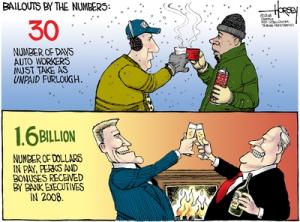- MENU
- HOME
- SEARCH
- WORLD
- MAIN
- AFRICA
- ASIA
- BALKANS
- EUROPE
- LATIN AMERICA
- MIDDLE EAST
- United Kingdom
- United States
- Argentina
- Australia
- Austria
- Benelux
- Brazil
- Canada
- China
- France
- Germany
- Greece
- Hungary
- India
- Indonesia
- Ireland
- Israel
- Italy
- Japan
- Korea
- Mexico
- New Zealand
- Pakistan
- Philippines
- Poland
- Russia
- South Africa
- Spain
- Taiwan
- Turkey
- USA
- BUSINESS
- WEALTH
- STOCKS
- TECH
- HEALTH
- LIFESTYLE
- ENTERTAINMENT
- SPORTS
- RSS
- iHaveNet.com
Liz Wolgemuth

The heated debate over the merits of the Employee Free Choice Act is particularly poignant for both union leaders and business interests, as it plays out during a recession that has ransacked corporate profits but sharpened the perception of high times that excluded workers in favor of shareholders and executives.
Despite being a top priority for unions, the bill seemed to have lost its life last month. But the Senate is considering compromises on the bill and may even bring it up for a vote next month.
It's crucial for workers to understand what drives the legislation's supporters and opponents.
The dwindling union ranks
Outsourcing and automation have hit the unions hard. After decades of declining membership, last year was something of a banner year for union growth. Ranks swelled by the biggest chunk in 25 years to hit 16.1 million, largely thanks to gains in government employee membership (government workers are five times as likely as other workers to be in unions).
The overall trend is pretty grim for labor.
Unions represent a smaller share of the workforce than in 1983, when data were first collected, and their ranks have dwindled in absolute numbers, as well. Indeed, while union membership was above 20 percent of the total U.S. workforce in the '80s, it is now at 12.4 percent. The EFCA would make it easier for workers to unionize, and it would allow unions to build their muscle once again. One study suggests the act would boost union rolls by 5 to 10 percent in the first year after its passage.
The threat of employer antagonism
Supporters of the EFCA argue that the conditions of the National Labor Relations Act have allowed employers to intimidate and threaten employees who attempt to unionize.
The current method of unionizing requires at least 30 percent of workers to sign cards indicating that they favor the formation of a union. The petition is sent to the National Labor Relations Board and, if certified, enables the employees to hold an election. A majority of workers then must elect to unionize.
A study released by the progressive Economic Policy Institute found that during the election process, "it is standard practice for workers to be subjected to threats, interrogation, harassment, surveillance, and retaliation for union activity." The EFCA would beef up damages against companies that unlawfully fire workers for supporting union organizing.
The threat of pressure from unions
Most of the debate about the Employee Free Choice Act revolves around the fact that it would allow workers to form unions by signing cards instead of holding an election. Union elections use secret ballot voting, in which workers vote in anonymity.
Opponents argue that allowing workers to form by signing cards would open employees to greater threat of union coercion. James Sherk and Paul Kersey of the conservative Heritage Foundation argue that "card check" means workers have less free choice than under the current election system, as "a democratic election with private ballots ensures that all workers can express their desires without fear of social stigma or retribution. With a private ballot, no one else knows how any individual worker voted, and workers can express their intentions without outside pressure."
The value of government intervention
Under the terms of the EFCA, government arbitrators could script the terms of the first contract.
If union representatives and the employer cannot reach an agreement within 90 days of the start of bargaining, then either side can ask the Federal Mediation and Conciliation Service to help resolve the differences. If, after 30 days working with federal mediators, the two sides have not reached an agreement, government arbitrators will be brought in to render a decision.
The U.S. Chamber of Commerce -- one of the most ardent opponents of the legislation -- argues that the arbitrators could create an agreement that neither party wants, and, "for an employer, you could be stuck with a contract that is completely incompatible with your cost structure and your business model -- and you would have to live with that contract for two years."
The value of unions
The debate over expanding the scope of unions is really significant only if unions themselves provide value to workers and yield additional power in negotiating with employers to improve the conditions for workers.
Wages are king, and the "union-wage premium," or the amount that union workers make above what nonunion workers make, is sizable, according to some research. The Center for American Progress calculates that over the four-year period from 2004 to 2007, "unionized workers' wages were on average 11.3 percent higher than nonunion workers with similar characteristics."
Union workers are also, on average, covered with better benefit packages than comparable nonunion workers. Some economists favor the legislation as the best shot at giving workers leverage at a time when companies have been slashing pay and benefits.
WORLD | AFRICA | ASIA | EUROPE | LATIN AMERICA | MIDDLE EAST | UNITED STATES | ECONOMICS | EDUCATION | ENVIRONMENT | FOREIGN POLICY | POLITICS
5 Things to Know About the Employee Free Choice Act